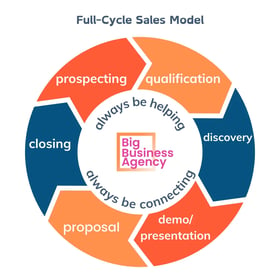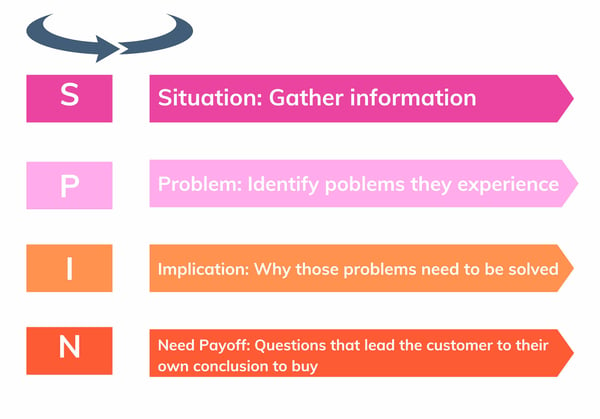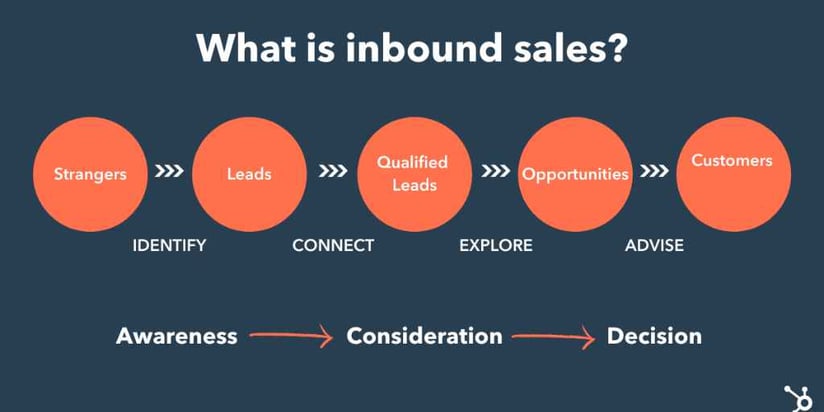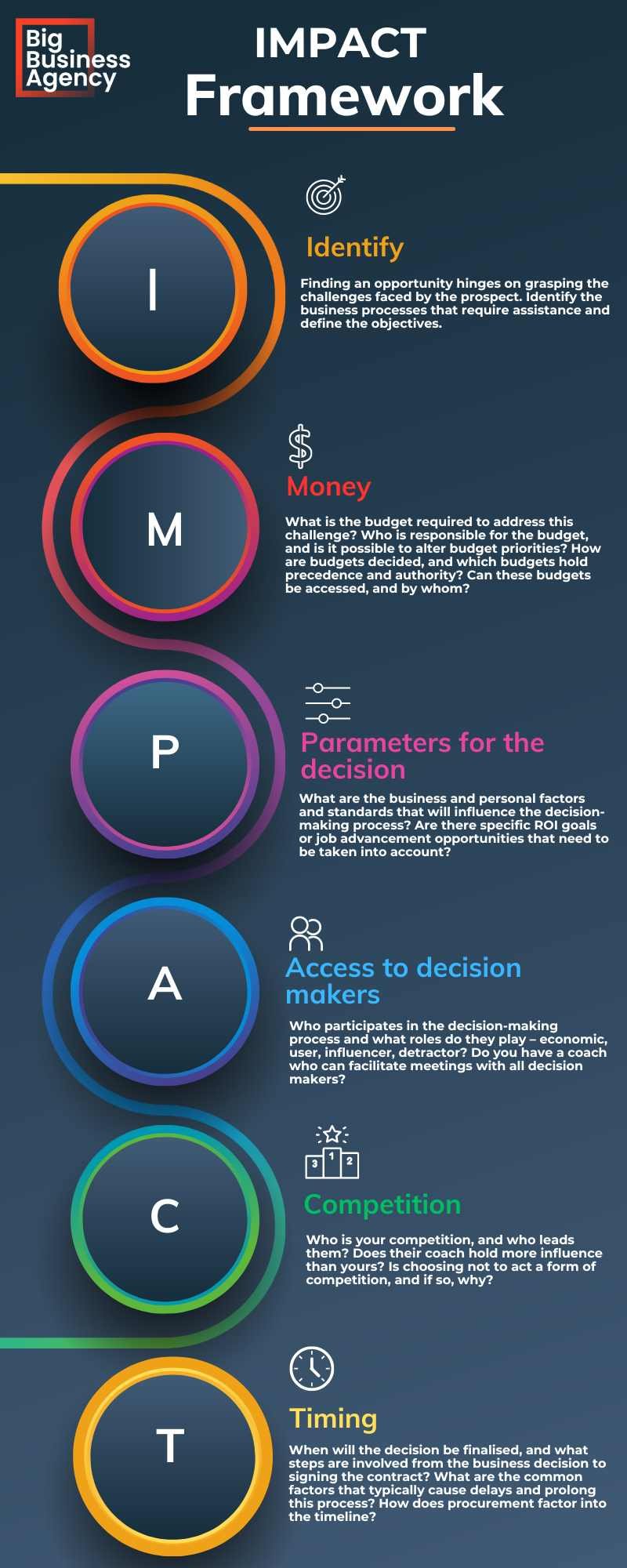Top B2B Prospecting Methods in 2025
Sales professionals must becontinually prospecting, so getting good at it isn't optional; it's essential! Unsure of where to begin? Look no...
14 min read
Peter
:
Feb 20, 2024 12:07:10 PM

When it comes to sales, putting the prospect first is crucial. Their success should always be the main focus in any deal you make. Every sales interaction should empower the buyer to achieve a goal, tackle a challenge, or meet a need. So, how can you elevate your efforts to drive better outcomes for your customers and your business? The key lies in mastering your sales process. But, which sales method is the perfect fit for your business? What qualification techniques complement the sales methodology?

Discovering the right sales methodology that consistently delivers on these objectives is crucial for crafting impactful sales initiatives that cultivate meaningful, mutually rewarding relationships with loyal, happy customers.
In this article, we'll be exploring the top B2B sales methodologies along with a few qualification frameworks. Whether you're a seasoned sales professional or just starting out in the sales world, understanding various sales strategies can significantly impact your success.
In no particular order, the methodologies, strategies and frameworks listed here each have their own unique purpose and cater to different sales scenarios. The secret to success is utilising the approach and method that best suits your customers, your business and your personality.
 by Neil Rackham, SPIN Selling is a powerful methodology that delves deep into the customer's world by asking strategic questions. By focusing on the customer's Situation, Problem, Implication, and Need-Payoff, sales professionals can uncover the underlying pain points and provide customised solutions that truly resonate with the customer's needs. This approach is all about building rapport, gaining insights, and offering value-driven solutions that address the customer's specific challenges. With SPIN Selling, sales reps can effectively guide the conversation towards a successful close, ultimately driving meaningful results for both the customer and the salesperson.
by Neil Rackham, SPIN Selling is a powerful methodology that delves deep into the customer's world by asking strategic questions. By focusing on the customer's Situation, Problem, Implication, and Need-Payoff, sales professionals can uncover the underlying pain points and provide customised solutions that truly resonate with the customer's needs. This approach is all about building rapport, gaining insights, and offering value-driven solutions that address the customer's specific challenges. With SPIN Selling, sales reps can effectively guide the conversation towards a successful close, ultimately driving meaningful results for both the customer and the salesperson.
Co-authors Matthew Dixon and Brent Adamson started "The Challenger Sale" by asserting that practically every B2B salesperson fits into one of five personas: relationship builders, hard workers, lone wolves, reactive problem solvers, and challengers. According to Dixon and Adamson’s research, salespeople are almost evenly distributed among these profiles. However, the most successful were the challengers — by a wide margin. This one group represented 40% of the top-performing reps in the authors’ study.
So what makes challengers so effective at selling? They follow a teach-tailor-take control process.
Challenger is a strategic approach that goes beyond traditional sales techniques. It involves not just selling a product or service, but challenging the customer's status quo and presenting new insights that can lead to a transformative buying decision. By taking control of the sales conversation, sales professionals can guide customers towards a new way of thinking and showcase the value of their offerings in a compelling manner. The Challenger Sale is all about pushing boundaries, sparking curiosity, and ultimately driving meaningful change for both the customer and the salesperson.
I n Solution Selling, the focus is not just on selling a product but on providing a holistic solution to the customer's challenges. (Another BBA favourite) this methodology involves diving deep into understanding the customer's pain points, motivations, and goals.
n Solution Selling, the focus is not just on selling a product but on providing a holistic solution to the customer's challenges. (Another BBA favourite) this methodology involves diving deep into understanding the customer's pain points, motivations, and goals.
Rather than selling specific products, salespeople who leverage solution selling lead with the benefits a custom solution can provide for the prospect. For example, a sales rep for a printing and design company could create a custom package of design services, signage, and business cards to fit the buyer’s needs.
This approach acknowledges buyers today are more informed and allows reps to meet prospects where they are. After all, it’s likely prospects have already researched your products and have a solid understanding of the offerings that suit them best.
With Solution Selling, sales reps identify prospect pain points and offer a customised mix of products to meet their needs. By taking a consultative approach, sales professionals can uncover the root cause of the customer's issues and present a tailored solution that addresses their specific needs. It's about showcasing the value and benefits of the solution, highlighting how it can truly make a difference in the customer's business or life. Solution Selling is all about building trust, demonstrating expertise, and ultimately offering a comprehensive solution that goes beyond just a transaction, creating long-term value for both the customer and the salesperson.
SNAP Selling, coined by Jill Konrath, emphasises the importance of keeping the sales process Simple, iNvaluable, Aligned, and Priority-driven. It's all about making the buying process easy and seamless for the customer. By simplifying the sales journey, sales professionals can eliminate unnecessary complexities and streamline the path to purchase. The focus on providing invaluable solutions ensures that customers see the true worth of the product or service being offered. Aligning with the customer's needs and priorities helps in creating a tailored approach that resonates with their specific requirements. This methodology ultimately aims to make the buying experience a smooth and efficient one, maximising customer satisfaction and driving successful sales outcomes. With SNAP Selling, sales reps can navigate the sales process with clarity and effectiveness, ultimately leading to stronger customer relationships and increased sales success.
Inbound Selling is a strategic approach developed by HubSpot that focuses on creating valuable and engaging content to draw prospects towards your business like a magnet. By crafting informative blogs, insightful white papers, entertaining videos, and engaging social media posts, you can establish your brand as a trusted authority in your industry. This content acts as a beacon, attracting potential customers who are seeking solutions to their challenges and positioning your business as the go-to source for valuable insights.
Inbound Selling is not just about selling a product or service; it's about building relationships, nurturing trust, and providing continuous value to your audience. By consistently delivering relevant and helpful information, you can cultivate a loyal following and convert leads into loyal customers. Embrace the power of inbound to drive organic growth, establish credibility, and create a strong foundation for long-term success in the competitive world of sales.
We are trialling this method right now and while it's early days, it's fair to say it's a good fit for selling into SME and Mid Market Tech companies. The "Identify" and "Connect" stages are condensed, which is ideal for less complex opportunities.

This methodology (a firm favourite with all of us at BBA) revolves around building a relationship with the customer, understanding their needs, and acting as a consultant rather than a salesperson. It's about being a trusted advisor throughout the sales process. Consultative Selling involves actively listening to the customer, asking probing questions to uncover their pain points, and providing personalised solutions based on their unique requirements. By taking a consultative approach, sales professionals can build credibility, establish trust, and ultimately become a valuable resource for the customer. This method focuses on long-term relationships rather than quick sales, with the goal of not just making a one-time transaction but becoming a trusted partner in the customer's journey towards success.
If you've ever found yourself intrigued by the art of selling, then the conceptual selling method might just pique your interest. This approach to sales is not your run-of-the-mill, pushy, "buy now" mentality. Instead, conceptual selling is founded on the idea that customers don’t buy a product or a service — they buy the concept of a solution the offering represents. Conceptual Selling is all about understanding the customer's needs and crafting a tailored solution that truly resonates with them.
One of the key aspects of Conceptual Selling is the emphasis on building relationships and trust with customers. By demonstrating genuine care and understanding, salespeople can create a strong connection that goes beyond a one-time transaction. This not only leads to increased customer loyalty but also opens the door to long-term partnerships and repeat business. So, if you're looking to up your sales game and connect with your customers on a deeper level, exploring the world of conceptual selling could be a real option for you.
The authors (Robert B. Miller, Stephen E. Heiman) encourage salespeople to ask questions that fall into five categories:
This sales methodology emphasises listening and divides the sales process into three stages: getting information, giving information, and getting commitment.
All transactions should be win-win for both the prospect and the salesperson. If the salesperson feels this is not the case, they should walk away from the deal.
N.E.A.T. Selling, a methodology crafted by sales experts Matthew Dixon and Brent Adamson, offers a refreshing approach to sales that revolves around the core principles of being Nurturing, Engaging, Assertive, and Targeted. This innovative framework emphasises the importance of striking a delicate balance between providing support and guidance to prospects while also confidently steering the sales conversation towards a successful outcome.
Being Nurturing in your sales approach entails fostering a supportive and empathetic relationship with potential customers. By actively listening to their needs, addressing their concerns, and offering valuable insights, sales professionals can build trust and rapport, creating a strong foundation for a long-lasting partnership.
Engaging prospects in a meaningful and interactive manner is key to capturing their attention and keeping them interested in your offerings. Through personalised communication, compelling storytelling, and tailored solutions, sales reps can captivate their audience and stand out in a crowded marketplace.
Assertiveness plays a crucial role in driving the sales process forward and closing deals effectively. By confidently articulating the value proposition of your products or services, overcoming objections, and guiding prospects towards a buying decision, sales professionals can demonstrate their expertise and leadership in the sales conversation.
Lastly, Targeting your sales efforts towards the right audience and focusing on high-potential leads can significantly enhance your sales success. By identifying ideal prospects, understanding their unique needs, and customising your approach to align with their preferences, you can maximise your sales effectiveness and achieve remarkable results.
The Sandler Selling System takes a unique approach to the traditional sales process, emphasising mutual investment between both buyers and sellers.
Focusing on building trust and acting as advisors, Sandler-trained reps aim to uncover challenges early in the qualification process. By addressing objections upfront and aligning solutions with client needs, they prioritise efficiency and effectiveness in the sales journey.
Rather than pushing a product that may not be the right fit, Sandler reps prioritise transparency and honesty, allowing the buyer to guide the sales conversation. It's about finding the best solution for the client, even if it means moving on from a potential sale.

Sandler Selling System
The Command of the Sale methodology involves selling with urgency, some degree of bravado, extensive product knowledge, and exceptional situational awareness — all aspects of sales that could be described as commanding in their own right.
The success of the methodology rests on a salesperson's understanding of what a prospect hopes to achieve, the ways a prospect wants to create value for their business, how the rep's solution — specifically — can make good on those elements, how the prospect measures success, and why the rep's business stands out from its competition.
With those bases covered, a salesperson operating within this methodology needs to be able to explicitly define how their solution suits their prospects’ problems, needs, and interests in a way their competition can't. And that pitch has to be enough to warrant charging a premium for their company's product or service.
Gap Selling created by Keenan, the author of "Gap Selling: Getting the Customer to Yes". Gap Selling is a methodology rooted in highlighting the gap between where a prospect's business currently stands and where they would like it to be. Its underlying premise rests on addressing problems as opposed to touting products.
With gap selling, reps put prospects first. They develop a deep, fundamental understanding of a potential customer's business, issues, and — perhaps most importantly — goals. Then, they determine the best possible way to position their product or service as the most effective means of filling those gaps.
Developing that understanding means digging deep — pinning down the root causes for any trouble a prospect might be having. As you may assume, that kind of intense examination can be time-consuming, so this methodology best suits sales teams that have the time and flexibility to take a holistic look at a prospect's situation.
Target Account Selling was created by Siebel (now Oracle) and is centered on the idea that picking the right prospects to engage with is the most crucial aspect of a sales process — that means paying careful attention to and conducting more extensive research during lead qualification, mapping out organisations, and creating buyer personas. (yes, TAS is another BBA favourite)
This particular methodology can lean heavily on sales automation — resources that can help your sales organisation identify traits that characterise prospects who will be most receptive to your solution and broader sales process.
The critical point with this methodology is to prioritise quality over quantity significantly when it comes to pursuing leads and targeting accounts. It involves putting in extra legwork at the beginning of a sales process, hoping that it will lend itself to higher close rates and more efficient sales efforts down the line.
TAS is especially useful for longer sales cycles and complex sales with high numbers of stakeholders and influencers. Think whole of government opportunities or large enterprise deals.
![]() Regardless of which sales methodology you use, a solid qualification framework is required to progress the sales through your pipeline.
Regardless of which sales methodology you use, a solid qualification framework is required to progress the sales through your pipeline.
MEDDIC , created by Dick Dunkel, stands for Metrics, Economic buyer, Decision criteria, Decision process, Identify pain, and Champion.
MEDDIC is a qualification process that really comes into its own in complex and enterprise sales. It is not a sales methodology, rather a guide to make sure you have asked all the right questions as you move through the sales process with your prospects and customers.
Metrics refer to quantifiable measurements that help sales reps gauge the progress of their sales efforts and track key performance indicators. By analysing metrics such as conversion rates, pipeline velocity, and average deal size, sales professionals can make data-driven decisions and optimise their sales strategies for maximum effectiveness.
The Economic buyer is the individual within the prospect's organisation who holds the authority to make purchasing decisions based on financial considerations. Identifying and engaging with the economic buyer early in the sales process is crucial for gaining buy-in and securing a successful deal.
Decision criteria are the specific factors that prospects consider when evaluating potential solutions to their challenges. By understanding the decision criteria that are most important to the prospect, sales reps can tailor their offerings and pitch to align with the prospect's needs and priorities.
The Decision process outlines the steps and stakeholders involved in the prospect's purchasing journey. By mapping out the decision process and identifying key decision-makers, influencers, and stakeholders, sales professionals can navigate the complexities of the sales cycle and effectively guide prospects towards a positive buying decision.
Identifying pain involves uncovering the prospect's underlying challenges, frustrations, and pain points. By empathising with the prospect's struggles and demonstrating an understanding of their needs, sales reps can position their offerings as solutions that directly address the prospect's pain points and provide tangible value.
Finally, the Champion is a key advocate within the prospect's organisation who champions the sales rep's offerings and helps drive the deal forward. Cultivating a strong relationship with a champion can significantly increase the likelihood of a successful sale and pave the way for future opportunities within the organisation.
Incorporating the principles of MEDDIC into your sales approach can help you qualify leads more effectively, navigate complex sales processes with confidence, and ultimately drive meaningful results for both you and your customers.
By leveraging the power of Metrics, engaging with the Economic buyer, understanding Decision criteria, mapping out the Decision process, identifying pain points, and cultivating Champions, you can certainly elevate your sales game and achieve greater success in your sales results.
![]() Created by IBM, BANT is one of the older sales tools that is still in use today. Because of its simplicity, BANT is an effective framework that acts as a guiding compass for sales professionals to navigate lead qualification. By delving into the four key components - Budget, Authority, Need, and Timeline - sales reps can gain valuable insights into the prospect's readiness to make a purchasing decision.
Created by IBM, BANT is one of the older sales tools that is still in use today. Because of its simplicity, BANT is an effective framework that acts as a guiding compass for sales professionals to navigate lead qualification. By delving into the four key components - Budget, Authority, Need, and Timeline - sales reps can gain valuable insights into the prospect's readiness to make a purchasing decision.
Budget serves as a critical factor in determining whether the prospect has the financial resources to invest in your offerings. Understanding the prospect's budget constraints upfront can help tailor your solutions to align with their financial capabilities, ultimately increasing the likelihood of a successful sale.
Authority is about identifying the decision-makers within the prospect's organisation who hold the power to green light a purchase. By pinpointing the individuals with the authority to make buying decisions, sales professionals can streamline the sales process, bypassing unnecessary hurdles and engaging with key stakeholders from the get-go.
Need revolves around uncovering the prospect's specific pain points, challenges, and requirements. By grasping the prospect's needs, sales reps can tailor their pitch and offerings to address these pain points directly, showcasing the value and relevance of their solutions in solving the prospect's problems effectively.
Timeline is all about understanding the sense of urgency and timeframe within which the prospect aims to implement a solution. By aligning your sales efforts with the prospect's timeline and demonstrating how your offerings can deliver timely results, you can instil confidence and drive momentum towards a swift and successful close.
Incorporating the BANT framework into your sales strategy allows you to focus your efforts on high-potential leads, prioritise your resources effectively, and increase your chances of converting prospects into loyal customers. Embrace the power of BANT to qualify leads efficiently, drive meaningful conversations, and ultimately achieve sales success in today's competitive marketplace.
Download and Keep this Guide on the top 12 B2B Sales Methodologies
IMPACT qualification framework, perhaps the best one you've never heard of, is a firm favourite with BBA.
IMPACT stands for - Identify, Money, Parameters, Access, Competition and Timing.
IMPACT is a great framework to use in a wide range of opportunities and industries, especially given how easy it is to remember!
High-performing sales folk concentrate on delving into understanding P (Parameters for the decision) and A (Access to the decision makers).
Fully understanding both the Parameters and Access takes multiple calls, meetings and workshops and uncovering how budgets are formed, what the funded priorities are and most importantly, how these norms can be influenced is key to winning rather than coming an admirable second.

Qualification is such a crucial part of any sales process it's important to spend the time to get really good at it. With the right framework to rely on, your job is much easier. Obviously, one size doesn't fit all, so try a few different options to understand what works best before you dive into rolling out a new methodology.
Got questions?
If you are considering implementing a new sales methodology and thinking about how to put one of these methodologies into motion, it's important to keep in mind that while the methodology may align well with your sales team, without their full support and engagement, it may not be effectively utilised.
Take a look at what Rachael Plummer — HubSpot Global Manager, Solutions Provider Program has to say;
 "Salespeople today are inundated with content. So while I think it's the best time to be a sales rep, it's also the hardest! There are a million different ways to have a connect call, send an email, or find new leads — and sales reps have to constantly parse through that content to pin down what they deem to be significant enough to implement in their day-to-day.
"Salespeople today are inundated with content. So while I think it's the best time to be a sales rep, it's also the hardest! There are a million different ways to have a connect call, send an email, or find new leads — and sales reps have to constantly parse through that content to pin down what they deem to be significant enough to implement in their day-to-day.
So as a sales leader, it's critical that if you are going to present a team with a new sales methodology and disrupt their current flow, you need to keep the capacity of new information the team is going to choose to retain in mind. Once I've determined that a new sales methodology is worth adopting, there are a few things I like to focus on to make it easier.
First, it's imperative that as a leader, you believe in the methodology yourself. For the team to prioritise this particular methodology, they have to know you believe in it too and that you're capable of implementing it. A reverse role play works really well here, where you, as the sales leader, play the rep and your team plays the customer.
Next, I like to emphasise how this new approach will help both the team and our customers. As a team, we have to believe in the mission — we have to see a North Star. Why would someone who continually achieves their goals stop doing what they're doing if they don't see the greater value?
This can be achieved by demonstrating an anticipated increase in leads, meetings, sales, or customer retention. If there isn't meaning behind the approach or a clear path to success, it will not receive the calories it deserves.
And finally, I like to ensure that the steps in a new sales methodology are outlined as simply as they can possibly be. Can it be digested and adopted within a matter of minutes? If we're going to ask a salesperson to take a step back in their day away from immediate revenue-generating activities, then that has to be the goal."
So there you have it, folks - the top sales methodologies, frameworks and strategies that can elevate your sales game and then some!
While each methodology has its unique approach, the key is to adapt and tailor them to suit your style and the specific needs of your customers. Experiment with different strategies, find what works best for you, and watch your sales soar to new heights!
Sales Consulting Services are a valuable resource for businesses looking to boost their sales and maximise profits. Skilled sales professionals with market expertise and strategic know-how collaborate closely with your team to evaluate your current status, pinpoint areas for enhancement, and offer tailored strategies for sales growth.
From Lead Generation Campaigns, Go To Market Strategy, defining Ideal Customer Profile, Pricing and Packaging review and Sales Process audit, we guide you on what to do and how to do it.
Most B2B Sales Cycles follow this process to varying degree depending on the business
In reality, B2B salespeople are constantly prospecting and qualifying leads. This list provides an view of the essential activities in your sales process.
Every business is unique, so take the time to do your research and find the methodology that best aligns with your specific needs. Consider factors such as the size of your sales team, the typical deal sizes you handle, and the level of experience within your team.
Explore qualification frameworks and choose one that aligns with your personality and business. Incorporate it into your daily routine. The more comfortable you become with using qualification techniques, the more effective your prospecting efforts will be.
Top Tip: Make sure you have easy access to your Qualification Framework (QF). One simple way to do this is to feature your QF prominently in your Sales Playbook.
Sales Hub Playbooks offer the flexibility to implement this for your entire team or tailor it to each individual salesperson.
When it comes to training, it's crucial to put the key learnings and new techniques into practice immediately.
This is vital if you want to extract maximum value from the training. By integrating the material into daily activities you can prevent it from being easily forgotten.
This is one way exceptional salespeople set themselves apart from the rest.
When considering the implementation of a new sales method, it is crucial to take a consultative approach to gain the support of the sales team throughout the process.
What are the stages of the sales cycle?
Ideal Customer Profile (ICP) and the Buyer Persona
Why Use Multi-Threading in B2B Sales?
Comprehensive Guide to B2B Sales
How you can boost your sales with Sales Hub
Why not join us at SpokeSpeak? - a Sales and HubSpot focussed community that's open to HubSpot enthusiasts, experts and newbies as well as those of you who are simply Hub-curious 🤔
Check out the latest episode at SpokeSpeak.com

Sales professionals must becontinually prospecting, so getting good at it isn't optional; it's essential! Unsure of where to begin? Look no...

Learn how to effectively implement spin selling strategies to boost sales and drive business growth

Discover the Power of Full-Cycle Sales For some it might be a case of back to the future, for others it's a whole new world of possibilities, which...